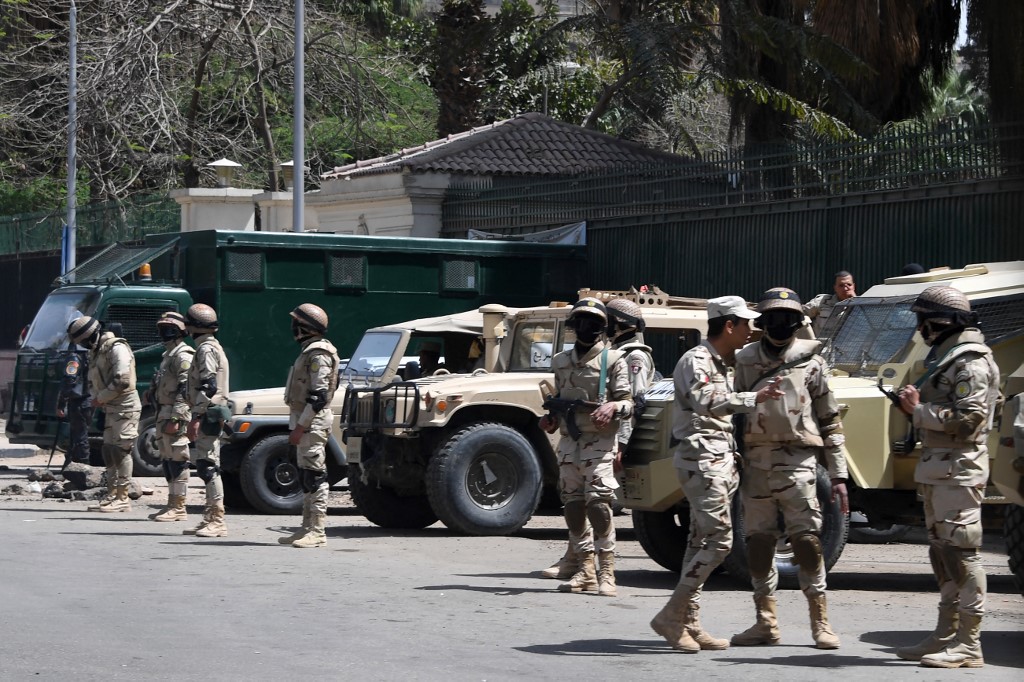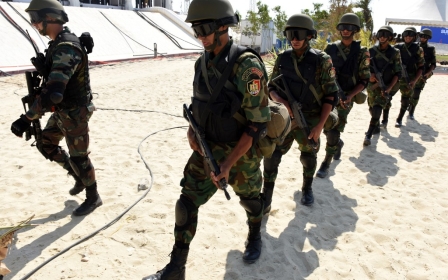Why Sisi cannot reform Egypt's military-driven economy

In a rare admission of erroneous policy, Egyptian Finance Minister Mohamed Maait said during a recent appearance on a popular talk show that relying on hot money had been a mistake.
The admission comes amid a deepening economic crisis, which saw Egypt's level of foreign debt soar to $158bn in March, compared with $145.5bn in December 2021, an increase of eight percent in four months.
In order to truly reform the Egyptian economy, the regime's system of militarised capitalism must be completely overhauled
This rise was accompanied by record inflation levels that hit nearly 15 percent, and the pound has lost nearly 22 percent of its value since March, when Egypt devalued its currency. On Monday, the central bank was buying one dollar for 19.01 pounds, compared with a rate of 15.6 in March.
Most worrying is the increased pressure on the state budget and the steady decline in foreign reserves. The costs of interest and debt repayment for Egypt's 2022/23 budget have jumped to $90bn, compared with around $63bn in the previous fiscal year - consuming more than half of public spending.
This places significant pressure on the government's ability to provide social services and to meet its future debt obligations without additional loans.
New MEE newsletter: Jerusalem Dispatch
Sign up to get the latest insights and analysis on Israel-Palestine, alongside Turkey Unpacked and other MEE newsletters
Foreign currency reserves dropped to $35.5bn at the end of May, from more than $37bn two months earlier. If this trend continues, the Egyptian pound will face additional pressure, with another potential round of devaluations that would further squeeze the poor and middle classes.
The deepening crisis drove the ratings agency Moody's to downgrade Egypt's outlook from stable to negative in May.
The regime's response to the crisis has relied on attempting to solicit external capital flows, mainly from the Gulf, and negotiating a new loan from the International Monetary Fund in order to meet its mounting obligations. Gulf states have pledged around $22bn in financial assistance to Egypt in recent days, including an investment agreement with Saudi Arabia worth an estimated $10bn.
At the same time, President Abdel Fattah el-Sisi has embarked on a massive privatisation programme, wherein $40bn of state assets are to be sold in the coming years. The regime is also expected to continue its borrowing spree, becoming the largest issuer of sovereign debt among emerging markets in Europe and the MENA region, with issuances of $73bn this year.
Financially disastrous
Such policies are a far cry from the radical transformation in the Egyptian political economy required to remedy the country's fiscal problems. In order to truly reform the economy, the regime's system of militarised capitalism must be completely overhauled.
This model, which relies on debt-driven investment in mega-infrastructure projects with dubious economic benefits, managed or executed by the military, has not only proven ineffective in alleviating poverty, but has also been disastrous for the nation's finances, putting Egypt in an extremely precarious position.
To alleviate the current crisis, Cairo should implement three related policy changes. First, it should divest itself of a large number of military-owned enterprises, especially in areas where the intervention of the military has caused significant losses to the private sector.
Second, it should move away from investing in mega-infrastructure projects, and instead focus on increasing the competitiveness of the Egyptian economy and deepening its industrial base.
Finally, the regime should overhaul taxation, from a regressive system that heavily taxes consumption towards a progressive system.
By eliminating all civilian power centres, the military has completed its domination of the state and changed its own nature, from a security institution to a political party
This would entail ending the plethora of tax exemptions enjoyed by military-owned companies, placing them under civilian control.
Such measures would not only strengthen the government tax base, which stands at around 14 percent of GDP, compared with around 28 percent in Morocco, but would also alleviate poverty and stimulate local demand, boosting the performance of the private sector, which has shown prolonged signs of negative growth.
The barriers to implementing such policies, however, are political rather than economic. This stems from the military's dominance over the state apparatus, and the lack of a civilian ruling party to balance the military, which weakens the position of the president.
Indeed, the most distinguishing feature of the Sisi regime, as compared with the Mubarak era, is the absence of a large civilian ruling party, such as the National Democratic Party, which the president could use to curtail the influence of the military and institute necessary reforms.
Limited options
Although parliament is populated by pro-Sisi parties, most notably Mostaqbal Watan, there is no evidence that they play any part in policymaking, nor do they take ministerial roles. This places Sisi at the mercy of the military as the governing institution in Egypt, severely limiting his policy options.
The supremacy of the military in the political system is even enshrined in the constitution, with a 2019 amendment adding that the duties of the military include "protection of the constitution, democracy, the state and its secular nature, and personal freedoms", vastly increasing its power.
The trend of militarising the state shows no signs of abating. On the contrary, all signs point to its intensification. In mid-July, General Salah al-Ruwaini, the head of the military judiciary, was sworn in as the deputy head of the constitutional court, setting a dangerous precedent that takes the politicisation of the judiciary to new heights.
In many ways, the regime is a victim of its own success. By eliminating all civilian power centres, the military has completed its domination of the state and fundamentally changed its own nature, from a security institution to a political party. For all practical purposes, the Egyptian military now acts as a ruling party, directly controlling policy and the state apparatus - with monumental consequences.
The most notable of these is the weakening of the position of the president, since he can no longer call upon civilian forces to balance the military. This leaves the regime highly constrained in terms of its ability to implement reforms, especially in the economic sphere, since the military benefits greatly from the status quo.
Any economic reforms would necessarily require Sisi to weaken the military's stranglehold over the state and the economy - an unlikely prospect, since this would entail a direct clash with his own power base. Thus, the proposed reforms are bound to be limited, and will fail to alleviate Egypt's deepening crisis.
The views expressed in this article belong to the author and do not necessarily reflect the editorial policy of Middle East Eye.
This article is available in French on Middle East Eye French edition.
Middle East Eye delivers independent and unrivalled coverage and analysis of the Middle East, North Africa and beyond. To learn more about republishing this content and the associated fees, please fill out this form. More about MEE can be found here.







